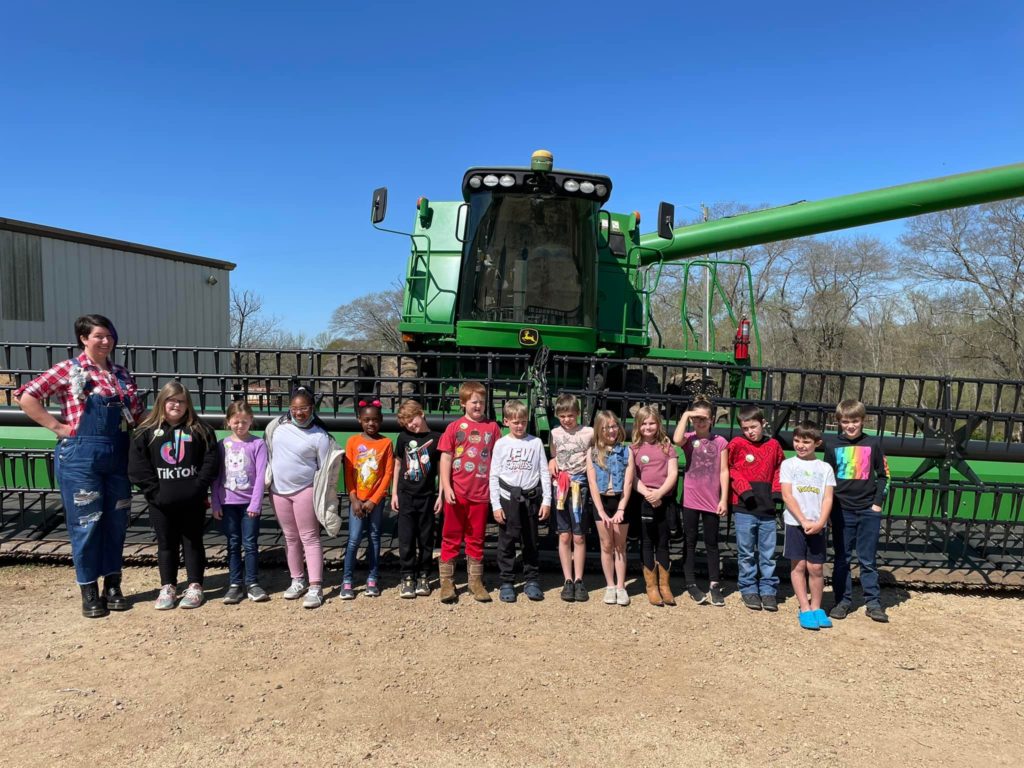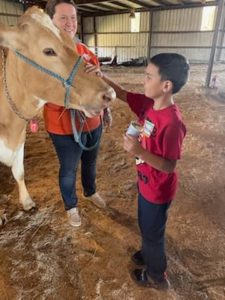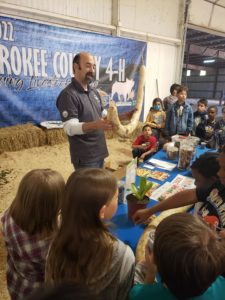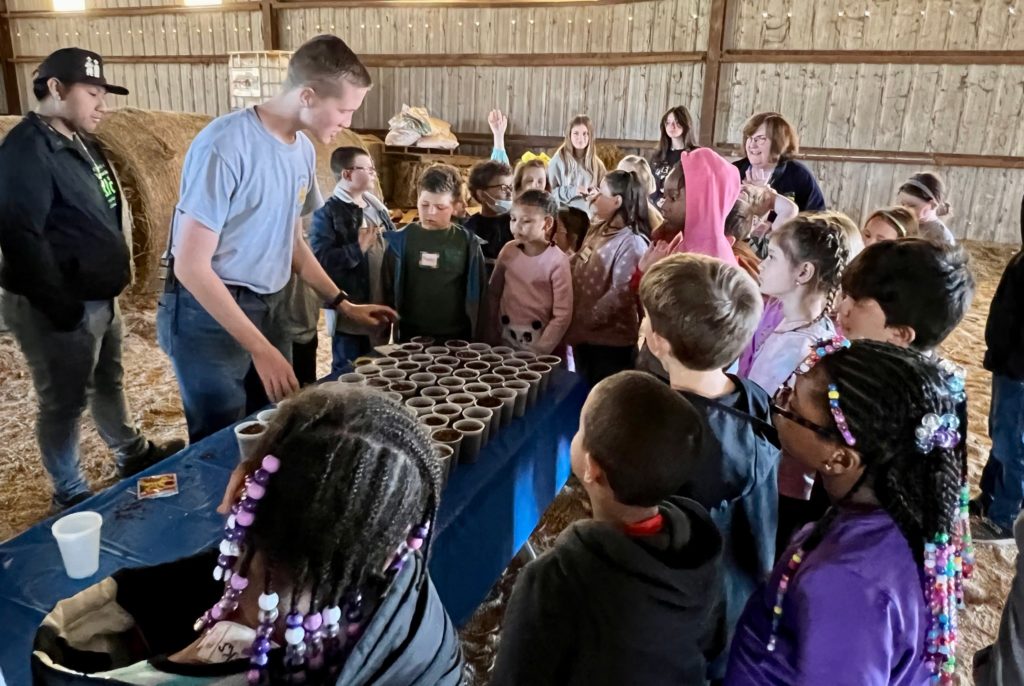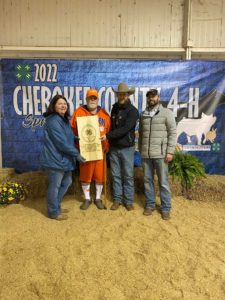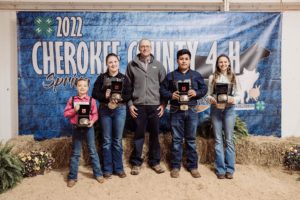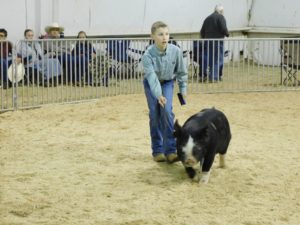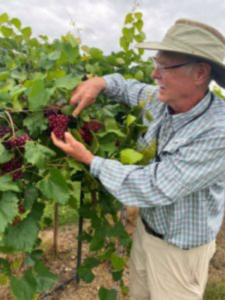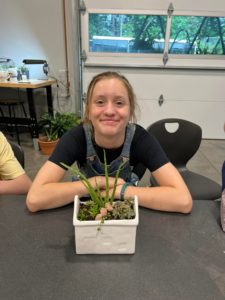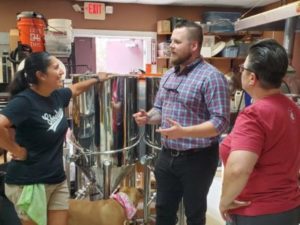Our Tractors and Implements for Forest Landowners series’s first and second articles covered tractor selection and ground contact implements (see links at the end). This third part will cover implements and attachments for property maintenance that the forest landowner should consider adding to their arsenal.
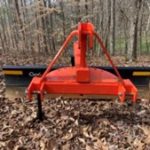
Adjustable scrape blade. Photo credit: Stephen Pohlman, Clemson University.
The first implements to discuss are box blades and scrape blades. The same principle applies to these, as did our ground contact implement article. You will want to pay attention to steel thickness and construction, added gussets and bracing, and proper width based on the size of the tractor. Typically, you will want your box and scrape blades to be at least as wide as your rear tires, just to leave a nice finished look behind you instead of tire tracks.
Box blades and scrape blades are often used for the same jobs; however, each has its intended purpose. A box blade is intended to keep things smooth/level. A scrape blade is intended to shape the ground. For example, if you plan to pull a ditch or crown a road, the scrape blade is a much better option. If you already have a surface that you are trying to maintain as smooth and level, then a box blade will be easier. Granted, you can do the same thing with a scrape blade. However, the scrape blade will roll material out one end, or both, during the process. In contrast, a box blade will store the excess material inside the boxed area to later be used for depositing in other holes/depressions. Scrape blades can come in adjustable models that make it easy for the operator to change the angle and pitch of the blade without having to change the tractor’s 3-pt hitch angles. Also, these adjustable models can be manual as well as hydraulic; however, the hydraulic versions will need to utilize the tractor’s rear hydraulic accessory block (‘remotes’ as some call them).

Box blade. Photo credit: Stephen Pohlman, Clemson University.
Box blades and scrape blades are also great prescribed fire management equipment, provided you already have pre-existing fire breaks. Dragging a box blade or scrape blade on these maintained fire breaks will keep you from fracturing the soil surface with a plow. This allows you to keep a hard soil surface that prevents soil erosion and gives you the bare mineral soil that you need to avoid fire from walking across your fire break. The one flaw with this is that leaf/needle litter will quickly fill a box blade and a scrape blade, causing it to ‘jump’ over a rolled-up pile of this material. Thus, the build-up of leaf/needle litter will at some point need to be pushed off to the side out of the fire break while dragging the fire break clean.
Another tool for our tractor is the front end loader. Most tractors in the 20-40hp class seem to come with loaders, but this is not always the case. A front end loader is often included as dealers add them due to customer demand. A front end loader can be a valuable tool if you need to lift things, like implements on and off trailers or lime/fertilizer for food plots, just to name a few. A front end loader can also help walk a stuck tractor out as well, though painstakingly slow. Do keep in mind that many of today’s front end loaders can take advantage of different front end attachments once you take the bucket off. Attachments such as grapple buckets, loader forks, rock buckets, 3-n-1 buckets, post hole diggers, etc., are most common for forest landowners. Some brands utilize the skid steer style attachment method, while others use their own proprietary system. Those with proprietary systems typically have a conversion kit or adaptor if the owner would rather have the skid steer style instead.

Grapple bucket. Photo credit: Stephen Pohlman, Clemson University.
One of the front end loader attachments mentioned above, grapple buckets, makes my life much easier as a forest landowner. Coming from someone who has bent their fair share of grapple buckets, know that they make different ones: standard duty, medium duty, heavy duty, and extreme duty. Each one has thicker and more metal, shields, braces, etc. One major factor to consider when buying a grapple bucket is weight. Make sure that your loader capacity meets not only the weight of the grapple but also the weight of the material you’ll be lifting. There are two kinds of grapple buckets, a brush grapple and a root grapple. By design, one is more clam-shaped, and the other is better at acting like loader forks for picking up and stacking things. Also, grapple buckets tend to have either one big grappling device or two separate clamping devices. The advantage of the two clamping devices is you will get a better bite/grasp on whatever you are trying to hold. Lastly, do know that your tractor will need to have a third function valve added for the front end loader to have the ability to open/close the grapple.
The next article in this series will be about vegetation management. We will get into things like sprayers, rotary cutters, and tree cutters in that article.
In case you missed them, here are the prior articles in this series:
Tractors and Implements for Forest Landowners- Part 1: Tractors- https://blogs.clemson.edu/fnr/2021/10/21/tractors-for-forest-landowners/
Tractors and Implements for Forest Landowners – Part 2: Ground Contact Implements- https://blogs.clemson.edu/fnr/2021/12/13/tractors-and-implements-for-forest-landowners-part-2-ground-contact-implements/
Author(s)
Stephen Pohlman, Cooperative Extension, Forestry and Wildlife Agent
This information is supplied with the understanding that no discrimination is intended and no endorsement of brand names or registered trademarks by the Clemson University Cooperative Extension Service is implied, nor is any discrimination intended by the exclusion of products or manufacturers not named. All recommendations are for South Carolina conditions and may not apply to other areas.
Clemson University Cooperative Extension Service offers its programs to people of all ages, regardless of race, color, gender, religion, national origin, disability, political beliefs, sexual orientation, gender identity, marital or family status and is an equal opportunity employer.





